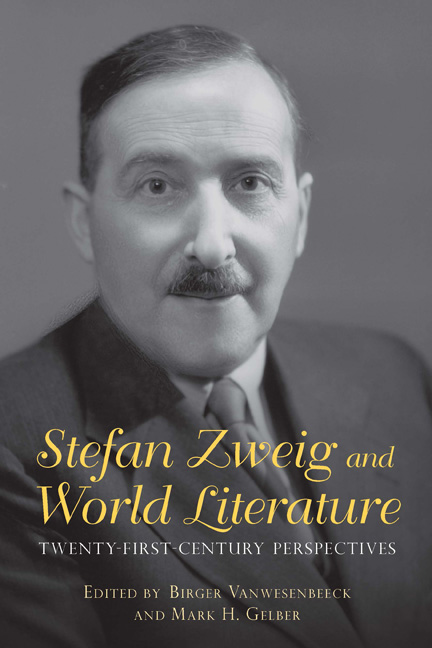Book contents
- Frontmatter
- Dedication
- Contents
- List of Illustrations
- Acknowledgments
- Introduction
- Part I Reception
- Part II Drama and Fiction
- Part III Criticism and Essays
- Part IV Politics and Exile
- 8 True to Himself: Stefan Zweig's Visit to Argentina in September 1936
- 9 Exile and Liminality in “A Land of the Future”: Charlotte and Stefan Zweig in Brazil, August 1941–March 1942
- 10 Stefan Zweig's Concept of Brazil in the Context of German-Jewish Emigration
- 11 Stefan Zweig: Life in Cities of Exile
- 12 The Writer's Political Obligations in Exile: The Case of Stefan Zweig
- Notes on the Contributors
- Index
9 - Exile and Liminality in “A Land of the Future”: Charlotte and Stefan Zweig in Brazil, August 1941–March 1942
from Part IV - Politics and Exile
Published online by Cambridge University Press: 05 May 2015
- Frontmatter
- Dedication
- Contents
- List of Illustrations
- Acknowledgments
- Introduction
- Part I Reception
- Part II Drama and Fiction
- Part III Criticism and Essays
- Part IV Politics and Exile
- 8 True to Himself: Stefan Zweig's Visit to Argentina in September 1936
- 9 Exile and Liminality in “A Land of the Future”: Charlotte and Stefan Zweig in Brazil, August 1941–March 1942
- 10 Stefan Zweig's Concept of Brazil in the Context of German-Jewish Emigration
- 11 Stefan Zweig: Life in Cities of Exile
- 12 The Writer's Political Obligations in Exile: The Case of Stefan Zweig
- Notes on the Contributors
- Index
Summary
To thousands of Jewish immigrants fleeing Europe during the Second World War, Brazil seemed a welcoming social utopia and a peaceful respite from chaos. The country's tropical warmth and its apparent racial and religious tolerance served as a stark contrast to the ravages of war and the official anti-Semitism rampant in Germany and other European nations at the time. Stefan Zweig and his second wife Lotte Zweig (née Charlotte Altmann) had already expressed their positive views about Brazil in letters to family and friends in Europe during their first trip to South America together in 1940. In a letter to his first wife, Friderike, he explained that Brazil is “der einzige Ort, wo es keine Rassenfrage gibt” (the only place where there are no racial issues). Yet it was Brazil's peacefulness that made it
eines der … liebenswertesten Länder unserer Welt. Es ist ein Land, das den Krieg haßt … Darum beruht auf der Existenz Brasiliens, dessen Willen einzig auf friedlichen Aufbau gerichtet ist, unserer besten Hoffnungenn auf eine zukünftige Zivilisierung und Befriedung unserer von Haß und Wahn verwüsteten Welt.
[one of the most lovable countries in the world. It is a country that hates war … So one of our hopes for future civilization and peace in our world, which has been destroyed by hatred and madness, rest[s] on the existence of Brazil, whose desires are aimed exclusively at pacific development.]
As late as November 1941, just a few months before the couple committed suicide, Stefan Zweig voiced his happiness with Brazil: “…we feel extremely happy here, the little bungalow with its large covered terrace (our real living room) has a splendid view over the mountains …”
Imagining a peaceful Brazil was important to the Zweigs' dreams, but after they made the decision to settle there, however temporarily, life in Brazil became untenable. Because of their relative economic, cultural, and social privileges—including their British citizenship—the Zweigs did not suffer the same as hardships many other homeless exiles who arrived in Brazil.
- Type
- Chapter
- Information
- Stefan Zweig and World LiteratureTwenty-First Century Perspectives, pp. 173 - 190Publisher: Boydell & BrewerPrint publication year: 2014



